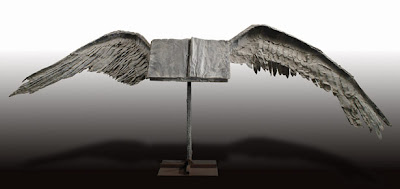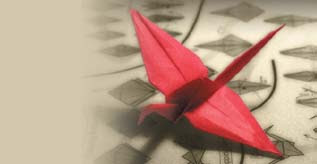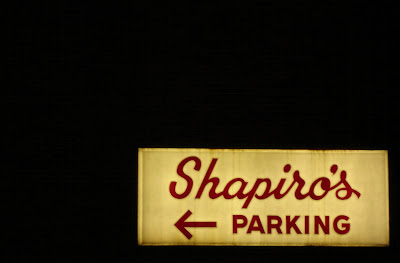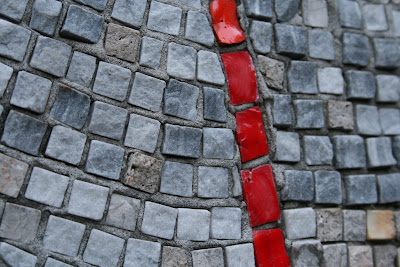Artists together in our enclave.
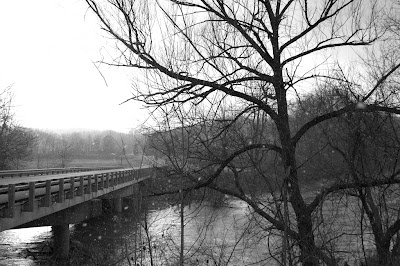
Today was the first meeting of my photography class, where my classmates include a former student and someone who once shopped my class but decided not to take it (though I barely remember this, and she showed no sign at all of recalling it). I have not yet decided what my name should be in that setting. Perhaps I should just switch to a pseudonym in my real life and get it over with.
At least for now, Kenyon's art buildings are clustered at the north end of campus, and photography takes place in what we knew as the Art Barn when I was a student. (It has some more proper name now.) When I walked into what is known as "the photography area," on the second floor, I looked up and saw an enormous framed portrait of my good friend Thomas (aka Four Inches of Ego), who looked down on me throughout the afternoon.
From where I sat, I also had a wonderful view of what the sun, coming through the Art Barn's enormous corner windows, was doing to one student's neck, backlighting wisps of hair, fairly gilding her. The longer I sat, the more it dawned on me that I will probably have to photograph people during this course. I started wondering whether my colleagues would sit for pictures. I started wondering who would let me photograph her face, who might let me take his hands. The one mention we had of our first project is that it may be a study of blurred motion. Motion? As alien to my pictures as people. I felt the worry mounting; I confessed freely to my nervousness at having enrolled in an actual art class. (You are no artist, whispers the same voice that hates everything I enjoy doing. Look at what happens when you shoot with your new camera.) (I can't face that point down yet; it is so frustrating: it seems that I may not be steady enough to get an image in focus. How is this possible?) I defy that fear again and again.
Seeing Thomas's picture on the wall made me think of the other people I knew who studied photography when we were all students here, especially my good friend who transferred away when she figured out that she wanted to do urban images. She had done a summer program out west, learning art photography techniques in Montana and New Mexico; there she learned how to superimpose her body over the landscape, how to match up the rise and fall of her hip to the rise and fall of a mountain range. Had her camera been a car, we'd have called it a beater. But her images were amazing, and she found them everywhere here. For my birthday our sophomore year, she gave me a tiny snapshot of the corner of a ruined house, weeds growing through what might once have been a bedroom window. She taped this scrap of photo to a scrap of paper with Scotch tape. I've never gotten a more beautiful birthday card.
Once, she did a series of topless shots of herself and of her roommate. She held a femur behind her, superimposed it over her spine. Her roommate held a hammer in front of her, its handle aligned with her sternum. At this point, she was shooting with a 4x5 camera, which meant she was taking Polaroids first, in order to determine whether she had her settings all right. (She did the single best portrait of me ever taken, during this phase; it took about 30 minutes to set up. I still have the Polaroid somewhere, but I think I gave the actual print away to someone, long ago, though he denied it when I asked him.) One night, in the study lounge where I worked, a group of fraternity brothers were snickering over something; it was their Hell Week, and they were basically living in the study lounge. They hadn't showered for days by this time, and they were nothing less than pungent. When they were herded out by their pledgemaster, I went over to see what had been making them so jolly. There were my friend's Polaroids, in a stack; either she or her roommate had left them behind. I conveyed them back to their owner, but the experience left me thinking that I'd been right in my decision not to pose as the figure drawing model that semester. In a place this small, that's just not necessary.
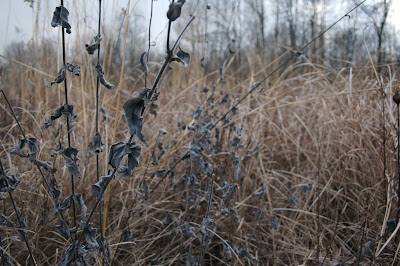
After today's class, I suited up (it's gotten cold here, suddenly) and wandered down to the swollen river, flooding into the fields because of our week of rain. I was hoping to get some shots I could love. But the temptation to go back to the point-and-shoot is a mighty one; now I realize fully just how much that camera did for me, and just how little I ever needed to know about what was going on in that silver box between my hands. That's what the class is for, I keep reminding myself; that's what the class is for. Soon I will know things.
By the time I got back to the officehouse, my face had gotten so cold that I couldn't move my mouth well enough to feel good about my talking. And of course I ran into a student who wanted to talk to me, before I even got inside. "I can't feel my face," I said to her. We had the conference she needed to have anyway. A friend stuck his head out the door to say hello. "I can't feel my face," I said to him. "I'm not going to help with that," he said, going back inside. But warm time thaws cold faces; soon I was back to normal, of my own accord.
My lovely photography professor tells us that we will all be in the "art zone" during class. "Everything else disappears here," she says. "And we will just be artists together in our enclave."
I love that I am about to have another enclave.
Oh, yes: if you checked in here around 4:21 p.m., you were the 10,000th recorded visitor to this site. Welcome to the five digits, everyone.
